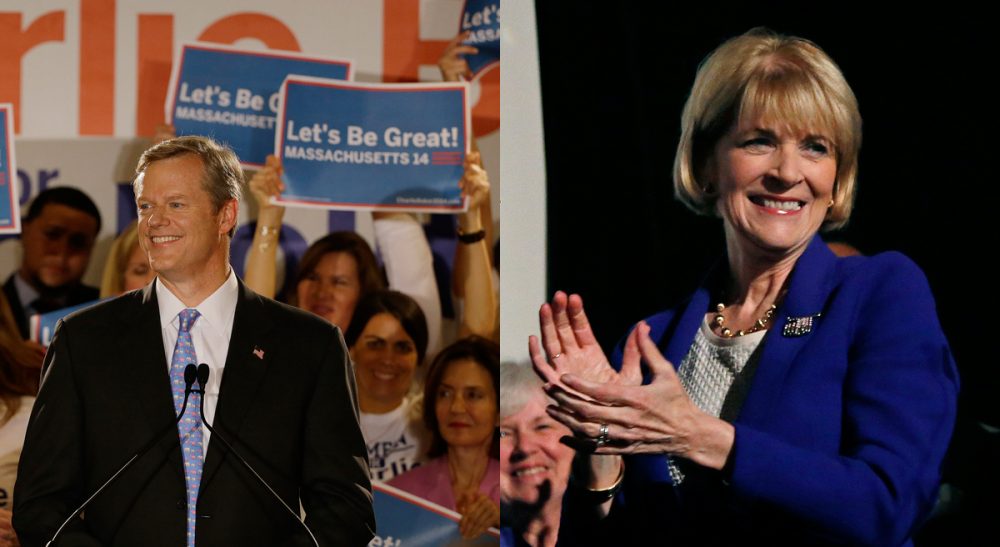Advertisement
What Martha Coakley And Charlie Baker Need To Do To Win

As predicted, Martha Coakley and Charlie Baker won their respective primaries amidst a sickly showing at the ballot box on Tuesday. While Baker cruised, Coakley’s slim margin over Steve Grossman demonstrated what many Democrats feared: She has a lot more hard work to do to shake off the effects of losing to Scott Brown in 2010.
Coakley, still the presumed frontrunner, made it through by taking advantage of a quiet summer during which few voters paid attention. Throughout, she avoided gaffes and remained vague on many issues. Nonetheless, she drew only 42 percent of the Democratic vote, a range that puts her squarely where Baker campaign strategists hoped the Democratic nominee would land.
Democrats backing Coakley may introduce the notion that their candidate is part of a tide of contemporary history that will also sweep Hillary Clinton into the White House in 2016. And why not?
Some expect the Coakley campaign to jumpstart things by going negative, and a hint of that was already on display in Tuesday’s victory speech. In this regard, it would be disappointing for PACs to expand on attack ads, already running against Baker, that distract from a debate over real quality-of-life issues. Coakley herself, in fact, cited negative ads – some from PACs based in her own party – as a reason for her unimpressive vote total.
The pool of issues that many expect will tempt anti-Baker attack ads comprises a dull lot. A regurgitation of blame for the Big Dig and the ill-advised, though hardly nefarious, campaign contribution to Chris Christie will qualify. And Democratic surrogates will carry on the tradition employed against Republicans running statewide in Massachusetts and try to tie Baker to the national GOP on social policy. This tack will be more difficult this time around, however, given Baker’s decision early in the primary to take a host of divisive issues like choice, gay marriage, gun control, minimum wage and immigration off the table, by establishing moderate-to-liberal positions on them. This was part of a broad strategy he believes will allow him to connect with open-minded voters on myriad pocketbook and good-government issues.
Baker thinks he can score with bread-and-butter issues like reducing taxes, making local aid more efficient, improving education, welfare reform and cutting red tape. He also appears willing to challenge Coakley to put forth new ideas – heretofore absent – to match his own.
Coakley may, however, benefit from a political narrative emerging on the national level. Democrats backing Coakley may introduce the notion that their candidate is part of a tide of contemporary history that will also sweep Hillary Clinton into the White House in 2016. And why not? Maura Healey’s crushing upset of Warren Tolman, who was even given a rare endorsement for naught by Governor Deval Patrick, may indicate that there’s something to this rising tide of women seeking higher office.
More important, the narrative would make the election about something bigger than any individual candidate. It would try to convert the ballot into a referendum on an idea whose time has come. That is, time for a woman to sit for a full term (or two) in the Governor’s chair on Beacon Hill and, come 2016, in the Oval Office.
Advertisement
Such a strategy would pose a challenge to Baker, and it remains unclear how he would offset it. By taking national social issues off the table, the Baker campaign surely strategized that his political movement to the center-left would help with women voters. Even so, those numbers have hardly budged since their measly showing in 2010. A corresponding danger, which the Baker camp may not have fully foreseen, is that some of those positions could actually hurt his standing with men, a category where he did well in 2010 and has to carry by a robust margin in 2014.
Baker’s best path is to stay the course on issues and challenge Coakley to debate him. She’s been in a cautious electoral mode for months, fending off challenges on the issues from Grossman and Don Berwick and revealing little about her own positions. This strategy was maddening to some in the progressive wing on the Democratic side who expected more from a potential flag-bearer. It’s also an approach that demeans the process. But it’s a strategy that’s worked so far for the deliberate Coakley. And there’s nothing yet on the horizon that would compel a change of course, so voters can expect more of the same.
The majority party in Massachusetts sometimes behaves as if its entitled to statewide office. Baker will make them work in this election.
Overall, the trends seem to favor Coakley. The general sense of voter malaise and low-grade disenchantment with some of the Patrick administration’s executive branch screw-ups won’t necessarily drive voters to the polls in outrage.
Still, it’s unwise to sell the Commonwealth’s voters short. They have 56 days to demand specific answers from their candidates on critical issues, and they are smart enough to change the channel on attack ads.
The majority party in Massachusetts sometimes behaves as if its entitled to statewide office. Baker will make them work in this election, and he will try to give voters what they deserve – a robust debate and a clear choice for the next four years.
Related:
